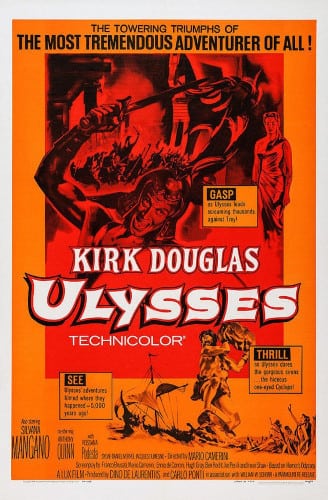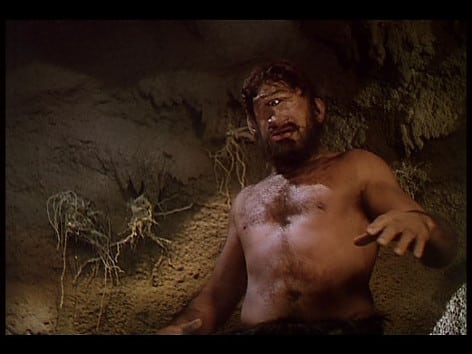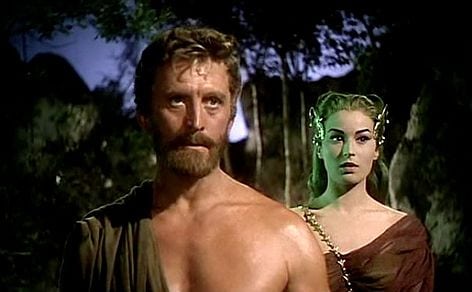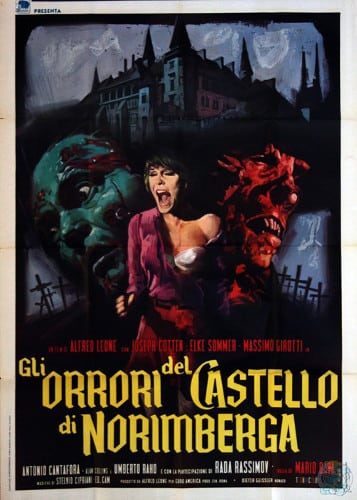Ulysses (1954)
Directed by: Mario Bava, Mario Camerini
Written by: Ben Hecht, Ennio De Concini, Franco Brusati, Hugh Gray, Irwin Shaw, Ivo Perilli, Mario Camerini
Starring: Anthony Quinn, Kirk Douglas, Rossana Podesta, Silvana Mangano
Italy
AVAILABLE ON DVD
RUNNING TIME: 114 min/104 min
REVIEWED BY: Dr Lenera, Official HCF Critic
Ulysses has been gone twenty years from his kingdom of Ithaca. Ten of those years were spent at the siege of Troy, but Ulysses has not returned home, and his wife Penelope is being pestered by a large number of suitors. In fact Ulysses is alive. He was washed up on the shores of a kingdom not far from Ithaca, but has lost his memory. He falls in love with Nausicaa and seems willing to stay forever, but just before the wedding, Ulysses has a memory breakthrough in flashback form. He begins to recall the adventures which kept him from his homeland for so long, largely because he offended the sea god Neptune….
Homer’s The Odyssey is a fantastic adventure saga and I’m always surprised that there hasn’t been more screen and TV versions of it [though of course there have been many productions inspired by it such as the Coen’s O Brother, Where Art Thou], though I recall that Ray Harryhausen once considered doing it [if only!], and there has been talk of late of a new version. There was a very fine miniseries in 1997 which is a lot of fun and pretty faithful, but to date the only straight movie adaptation is this heavily abbreviated 1954 effort, which I decided to review and post just before my next Mario Bava review – Hercules In The Haunted World – because Bava photographed it and even supposedly directed some of it. The film is a bit stilted in places, while my experience of viewing it was not helped by the Region 1 DVD [from Lionsgate no less] being of very poor quality, with middling picture quality and terrible sound where some dialogue is hard to hear and you can barely hear the score. But I could still appreciate the movie as a fun old style fantasy adventure [though of the kind where you really do expect a Harryhausen stop motion creature to pop up every now and again] which after a sluggish first quarter becomes very lively and doesn’t deviate from the story very much.
The original director for the joint American, Italian and French [though mostly Italian] production was intended to be George Wilhelm Pabst [yes, the director of silent masterpiece Pandora’s Box], but he quit at the last minute when it was decided that the film was to be shot in 3D using a new process developed by the Richardson Camera Company, which allowed parallel filming of 3-D and non-3D versions. He was replaced by Mario Camerini. The screenplay has seven names attached to it including Hollywood master Ben Hecht, though it was Franco Brusati who wrote the majority of it. Some of the movie was shot on the Mediterranean coasts and islands described by Homer, but plans to shoot on Ithaca were thwarted because of an earthquake. Depending on what source you read, Camerini either left the production or was deemed to be not doing a fast enough or not very good job, but in any case Bava was brought on to direct some of the film, though he went uncredited. The film ended up being released solely in 2D and was a solid hit both domestically, where its success in Italy led to the production of Hercules and the tidal wave of peplums – cheap and cheerful adventures set in ancient times usually starring wrestlers – and internationally. The export version, which is what is on the Lionsgate DVD, is around ten minutes shorter than the Italian version. There is a German DVD with the uncut version, but it’s both very rare and very expensive. I admit, I didn’t notice any glaring edits in the cut version.
One mildly annoying thing about Ulysses is that most of the characters are called by their original names, including the goddess Athena, but Odysseus [Ulysses] and the god Poseidon [Neptune] are called by their Roman variants. The film gets into its story in a rather convoluted manner which does mirror Homer but doesn’t work so well on screen, partly because some details, like Ulysses having been held captive by the nymph Nausicca for seven years, are missing, and partly because some of these early scenes are rather static and paced extremely slowly. The sacking of Troy is realised by a painting of a wooden horse and a few brief action shots, and after spending a lot of time with Penelope and Ulysses’ son Telemachus, we do eventually switch to Ulysses properly, and we get a rather good wrestling scene, but I reckon many modern viewers would find the early part of Ulysses a bit of a slog until we flashback to the first of Ulysses’ adventures and from then on the pace is swift as he and his men have several strange encounters, though of course only a few of the ones that they have in the book. I was both surprised and pleased though that Homer’s brutal climax, which involves Ulysses basically massacring loads of people, was included in what is in many ways a rather juvenilised adaption [no bickering Gods here], something enhanced by the English dubbing, though there’s still a bit of sex and female glamour here and there, something that would be continued in the similar Italian films to come.
The most famous of Ulysses’ encounters, the one with the Cyclops Polyphemus, is reasonably exciting, and, while a 35 foot mechanical giant was built for the film and moved by wires and bellows, the character is mostly realised by an actor with a mask who is usually shot from low to make him seem big. Unfortunately, this section has an absolutely ridiculous bit when the humans trample loads of grapes to make wine to get Polyphemus drunk. Aside from the fact that the men look like they are either doing a silly dance or on a treadmill as they crush the fruit, we’re supposed to believe that the grape juice becomes proper wine in an instant. I was really shaking my head at this scene, but believe me when I say that nothing else in the film is as ridiculous [though there’s a daft bit near the end where Ulysses is supposed to be disguised as a beggar but his disguise is so limited it’s ridiculous how his wife doesn’t recognise him] and other little bits of humour, often very ‘matter of fact’ lines spoken by Ulysses, do come off quite well and perhaps shows the hand of Hecht whose input can’t really be seen elsewhere. The part with the unseen Sirens, who lure sailors to their deaths with their songs, is nicely done though, Ulysses, who gets his men to bind him to a post so he can be the only man who hears the Sirens and survives, hearing eerie wailing and the voices of his wife and son trying to lure him to join them.
Despite the mediocre quality of the DVD, one can see that Ulysses, despite Bava’s cinematography, for the most part, not being especially noteworthy, is a visually attractive picture making good use of its locations, with nice looking sets and with some interesting costume work, though some of the outfits people wear look like they belong more in the Middle Ages or later than in Ancient Greece, as if they’d just used as many costumes from historical productions as they could find. Special effects are very limited but the film manages to get by nonetheless. Camerini’s direction is mostly a bit stolid, which brings me to what did Bava actually direct? The only section of the film which shows the Bava touch to me is when Ulysses and his men are on the island of Circe, the enchantress who traps Ulysses in what is basically sexual captivity and turns his men into pigs. There’s some pretty cave sets and nice use of the colour green, especially when it bathes Circe. When Ulysses visits part of the Underworld and sees some ghosts, it’s like watching a precursor to Bava’s 1961 almost surreal peplum Hercules In The Haunted World. Elsewhere though it’s hard to discern Bava’s hand though of course it’s possible that he hadn’t formed his style yet. Oddly enough Bava later directed two episodes of a lengthy Italian TV series based on the same subject Odissea in 1968.
As with many older Italian films, you can’t really watch a definitive version of Ulysses because it was shot silent with cast members speaking various languages and then dubbed in various languages. Kirk Douglas dubbed his part for the English language version but actually seems to be speaking Italian! Nonetheless, he gives a typically muscular and slightly tongue-in-cheek performance. Later on the same year he would find greater success at sea in 20 000 Leagues Under The Sea. Anthony Quinn has a good part as the main suitor while the delectable Silvano Mangano plays both the major female roles – Penelope and Circe. It’s an odd device which works, kind of. Rossano Podesta, who plays Nausicca, would star in the title role of Helen Of Troy two years later, which of course is basically a prequel to Ulysses. Alessandro Cicognini’s score was, as I said earlier, very hard to hear on the DVD but it didn’t seem very good and perhaps too light in places. This Ulysses is a little stiff and clumsy but is still a decent attempt to tell the tale with quite limited resources. I often find older fantasy adventures like this to have more charm, and in a way seem more authentic, than their modern equivalents. And I reckon a decent DVD or Blu-ray could work wonders.











I recall seeing the film at my prep school in the 1950s and being completely enthralled by it. Delighted at being able to find it again. Oddly my memory of it proved pretty accurate, not surprisingly of the Cyclops and Sirens sequences.